The contemporary retail landscape is rapidly evolving, primarily influenced by the preferences of today’s digital-first generation, Gen Z. The post-pandemic era has ushered in a significant shift from a channel-centric approach to one that is truly customer-centric. This transformation underscores the necessity for brands and retailers to actively engage with consumers and understand their evolving needs, preferences, and shopping habits.
An Overview of Retailing in India
India stands as one of the world’s fastest-growing retail markets, boasting a massive population of 1.42 billion people. The retail sector plays a pivotal role in India’s economy, contributing approximately 10% to its GDP. India currently ranks as the world’s fifth-largest economy, behind the USA, China, Japan, and Germany. However, it is poised to leapfrog Japan by 2030, with a projected GDP of USD 7.3 trillion. This remarkable growth is propelled by the expanding middle class, with nearly half of the one billion Asians expected to join the global middle class by 2030 originating from India.
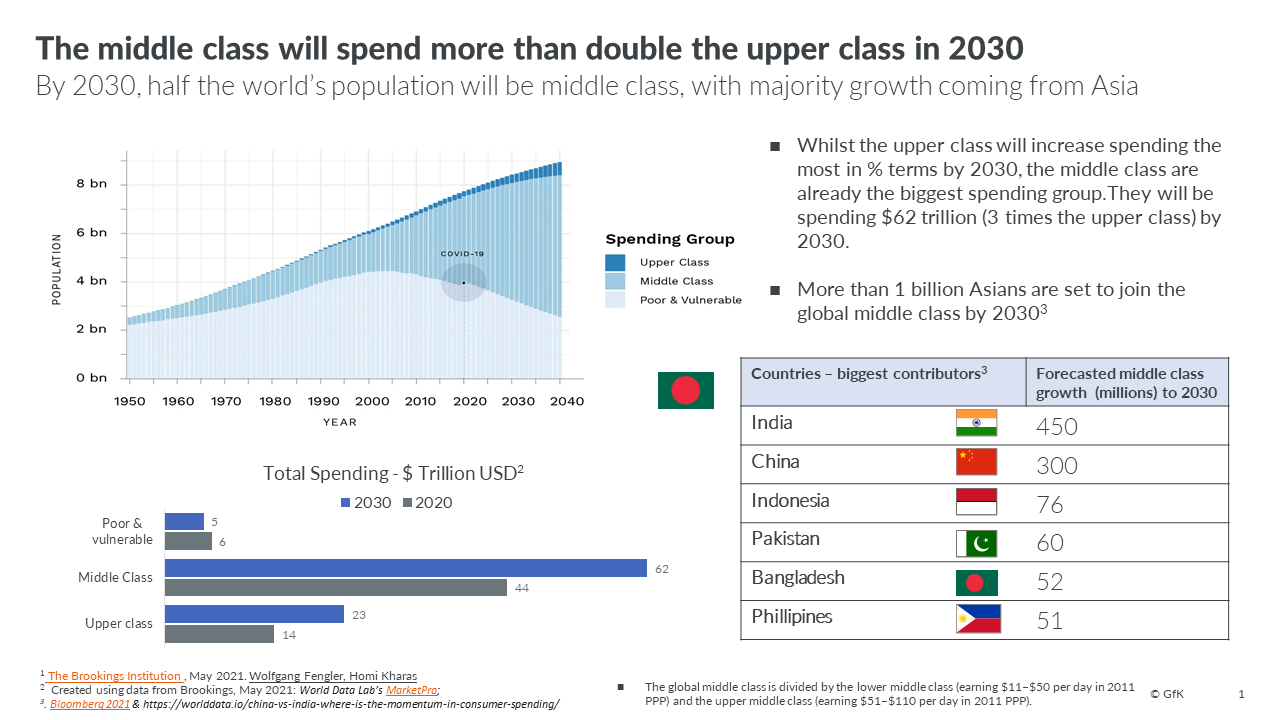
Gen Z – Influencers of Future Retail
- GenZ’s Demographics and Characteristics: India’s population, with a median age of 28.2 years, is dominated by Gen Z and Millennials, constituting 52% of this demographic. Notably, India is home to 116 million Gen Z consumers, accounting for almost 20% of the global Gen Z population. This generation is the first to have grown up with unfettered access to the internet and smartphones, making them adept at seeking digital information, conducting extensive online research, and seeking recommendations from peers, family, and influencers.
- Gen Z Shopping Habits:
Gen Z’s digital prowess is fundamentally changing their everyday shopping experiences. To comprehend Gen Z’s shopping habits and preferences, a deeper understanding of their unique characteristics, attitudes, and technological inclinations is imperative. Gen Z relies heavily on the internet and smartphones to access information, compare prices, and seek recommendations. They expect brands to champion environmental responsibility and inclusive sustainability while providing a seamless shopping experience, streamlined checkout processes, and multiple payment options. Although they predominantly shop online, they also value in-store experiences. This transformative digital landscape challenges retailers to embrace personalization over mass communication.
Retail Strategies and Challenges: Consumer technology retailers reassess formats, operations, and purpose to position for growth
In response to the evolving landscape, consumer tech retailers are reevaluating their formats, operations, and purpose to secure growth and differentiation in an increasingly demanding environment. With high inflation and rising consumer expectations for everything from delivery to sustainability, retailers face critical testing of their strategies. A global survey by GfK, involving nearly 800 retail executives across 76 countries, highlights four interconnected areas of opportunity: formats, technology, operations, and purpose.
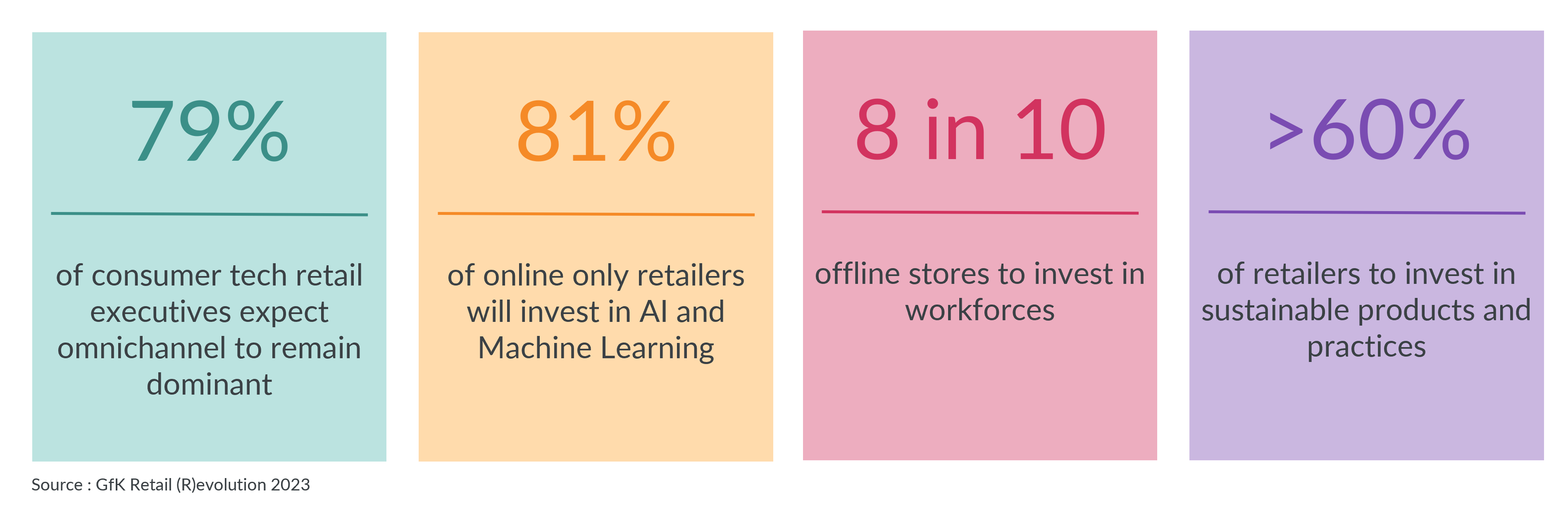
- Formats in Transition: Emerging markets are undergoing a remarkable transformation with the introduction of new formats such as internet marketplaces, favored for their reach, affordability, and extensive range. Moreover, traditional retail websites worldwide are evolving to offer better-personalized product recommendations and more straightforward transactions.
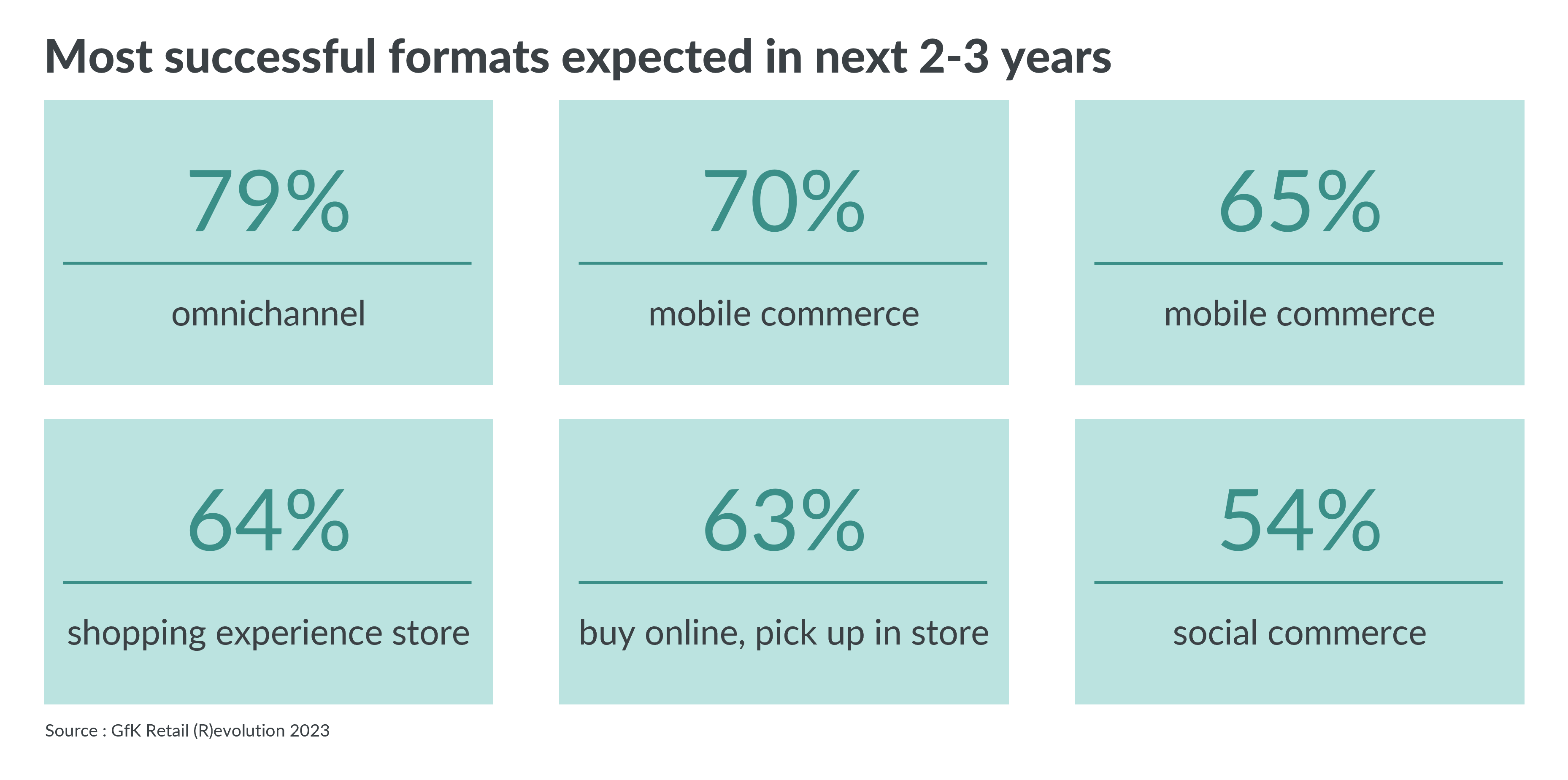
The shift toward online sales across various categories is deepening, particularly as consumers become increasingly digitally mature. As comfort with digital channels grows, opportunities for social commerce and even the metaverse are becoming more tangible. The survey indicates substantial investments in rapidly evolving physical and digital formats by retailers worldwide, with the fastest growth in social commerce expected in the Asia-Pacific region.
- Technology Advancements: Gen Z, being digital natives, demands easily searchable information to ensure the availability of the most relevant products. Retailers are responding by focusing on demand forecasting and personalization.
The GfK survey reveals that retailers are steadfastly prioritizing demand forecasting and consumer personalization. Predictive insights are particularly emphasized by omnichannel players, with AI playing a pivotal role in forward-thinking pricing strategies, personalized shopper experiences, and margin protection. While retailers acknowledge the potential of technological advancements, there is hesitancy regarding tech investments due to lengthy return-on-investment timelines. Notably, pure-play online retailers are leading the way in embracing intelligent technologies, as revealed by the GfK survey.
These online-only businesses have demonstrated the highest level of confidence in their capacity to effectively implement AI and ML solutions. This heightened confidence can be attributed to several factors that make online retailers particularly well-suited for such technologies.
Online-only businesses rely heavily on streamlined processes, allowing for rapid strategic adaptability. They understand that in the fast-paced world of e-commerce, agility is key. Furthermore, their success hinges on their users’ ability to swiftly locate the items they desire from a vast array of choices. The seamless user experience is crucial for retaining customers and driving sales.
Additionally, pure-play online retailers possess a wealth of data, which is a fundamental prerequisite for developing robust AI and ML models. Their digital operations generate vast amounts of information on customer behaviors, preferences, and market trends. This data serves as the building blocks for training and refining AI algorithms, enabling these retailers to provide personalized recommendations, optimize supply chain logistics, and enhance the overall customer journey.
As a result, the alignment of online-only retailers with AI and ML technologies is not only driven by their confidence in these tools but also by the inherent synergy between their business models and the capabilities offered by intelligent technologies. These companies understand that in a highly competitive digital landscape, staying at the forefront of technological innovation is essential for their continued success.

- Exploring Augmented Reality and Blockchain: The retail sector is on the cusp of a technological renaissance, driven by the convergence of Augmented Reality (AR), Blockchain, and the transformative power of Generative AI. This amalgamation offers a treasure trove of opportunities, reshaping the way we shop and market products.
Augmented Reality has already begun to revolutionize retail by offering consumers immersive shopping experiences. With AR, customers can visualize how that new couch will fit in their living room or try on clothing virtually. This not only enhances customer engagement but also reduces returns, a game-changer for retailers.
Retailers are beginning to explore the potential of augmented reality and virtual reality to enhance brand experiences, enabling immersive product trials and improved in-store navigation.
Blockchain technology, on the other hand, promises unparalleled transparency and trust in the retail supply chain. Consumers can trace a product’s journey from its source, ensuring authenticity and quality. This is particularly crucial for industries like food and luxury goods. Additionally, Blockchain-enabled cryptocurrencies streamline cross-border payments, reducing costs and enhancing security.
Generative AI, the dynamic force behind AI-generated content, is the missing piece that takes retail marketing to the next level. It empowers retailers to create personalized and compelling marketing materials at a scale. Generative AI can craft product descriptions, ad copy, and even generate imagery, saving time and resources. This not only streamlines marketing efforts but also tailors content to individual consumer preferences, boosting engagement and conversions.
In essence, the fusion of Augmented Reality, Blockchain, and Generative AI is a paradigm shift in the retail industry. It offers consumers richer experiences, assures them of product authenticity, and allows retailers to market products in ways that were once inconceivable. Those who seize these opportunities are poised to lead the charge in this new era of retail.
These technologies are also favored by retailers with physical stores, where live experiences offer a unique advantage. Therefore, blockchain is gaining attention as a solution for fraud prevention, supply chain improvement, and enhanced product traceability and sustainability. These technologies are critical in meeting the expectations of Gen Z consumers.
- Operational Excellence for Seamless Experience: Gen Z consumers expect a seamless shopping experience, whether they are searching broadly or specifically, online or offline. They desire quick access to the products they seek. Delivery speed has gained prominence, motivating consumer tech retailers to enhance their internal operations’ efficiency and effectiveness.
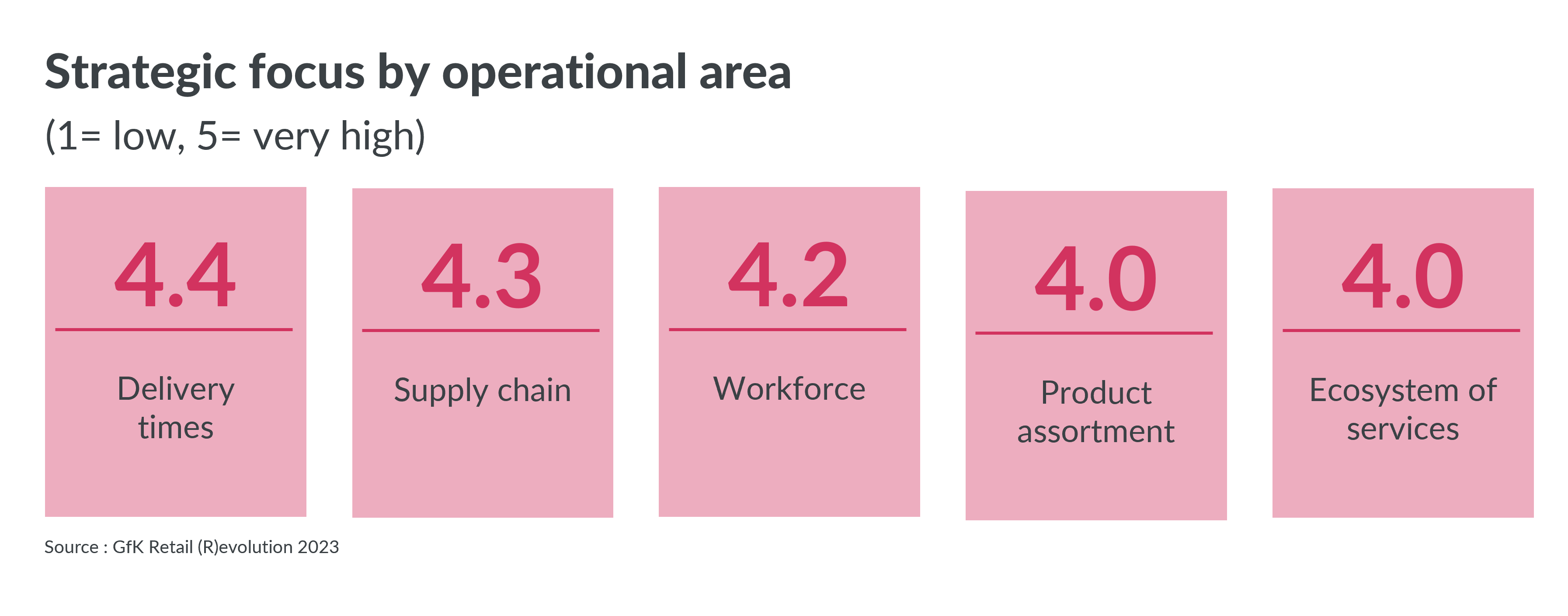
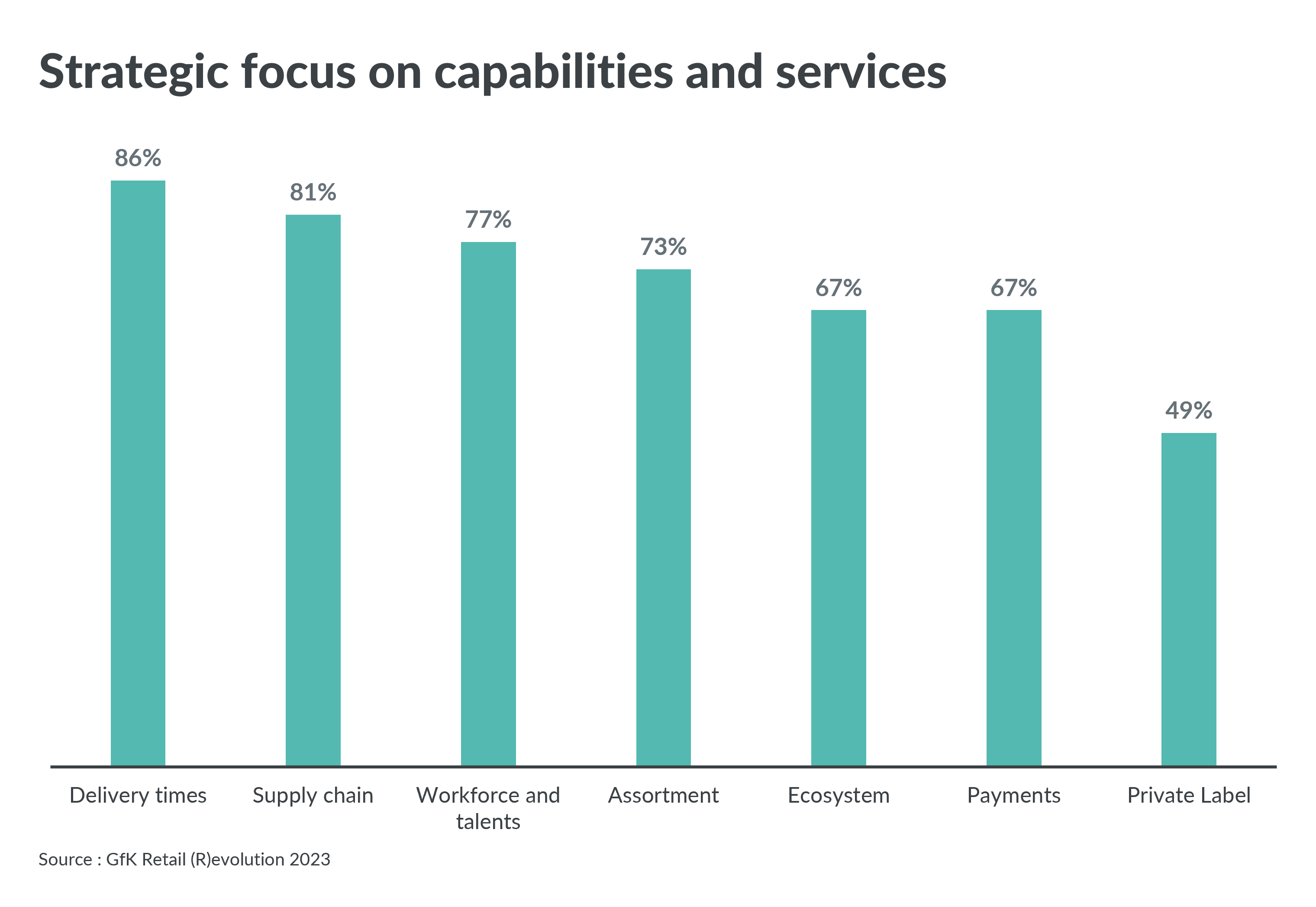
The survey highlights that nine out of ten retailers are actively working on improving delivery times, while product availability significantly influences over a third of consumers’ choice of retailers. Eliminating supply chain bottlenecks and implementing effective demand forecasting are increasingly critical in achieving retail efficiencies and balancing the supply chain for seasonal and event-specific offerings.
- Expanding Ecosystems: Operational excellence goes beyond optimization for retailers, with many aiming to broaden their service offerings. Approximately 67% of retailers are focusing on developing their ecosystem of services.
Across various retail types, the focus involves evolving in-store entertainment and educational capabilities for complex products which can enhance consumer loyalty and differentiation. Simplified transactions and flexible payment methods are high priorities in response to consumers’ preferences.
The survey findings reveal an intriguing trend: nearly half of omnichannel players are actively considering the development of private labels. This strategic move holds the potential to significantly enhance consumer loyalty by offering an exclusive destination for select products. Such a differentiation strategy is becoming increasingly vital in an intensively competitive retail landscape.
Private labels can set retailers apart, creating a distinct value proposition that resonates with consumers. This uniqueness becomes a magnet for customers, cementing their allegiance to the brand. In an era where shoppers have an abundance of choices, the ability to provide something they can’t find elsewhere becomes a powerful tool for driving brand loyalty.
As the retail landscape continues to evolve, the establishment of private labels offers omnichannel players a means to not only secure their position but also to thrive. It’s not just about being another option in a sea of choices; it’s about becoming the ultimate destination for consumers seeking quality, value, and exclusivity. By focusing on private labels, these retailers are making a strategic investment in their future competitiveness and success.
- Tech and Workforce Excellence: Having a reliable and skilled workforce is crucial for retailers. Investing in talent development and creating a nurturing environment are strategic priorities for retailers across the spectrum.
Over three-quarters of retailers anticipate focusing on workforce and talent development in the coming years. This focus is particularly critical for businesses seeking to enhance in-store experiences and compete effectively with web and mobile rivals.
- Embracing Purpose: Gen Z consumers are highly conscious of their actions’ environmental and ethical impacts. Their concerns extend from the environmental footprint of consumer tech and services to the ethical considerations in product materials.
Having a clear purpose is pivotal for gaining the support of all generations, particularly Gen Alpha and Gen Z. As critical future customers for retail brands, it is essential to engage them and foster their loyalty. Gen Z and Gen Alpha increasingly prefer retailers committed to ethical and environmental transformation, even in the face of cost pressures.
- Sustainability as a Driving Force: Sustainability is now widely viewed as important by consumers across regions, ranging from less developed nations witnessing sustainability concerns’ direct impact to developed markets where higher spending power empowers more consumers to act on their values.
This commitment to sustainability includes selling products made from recycled and recyclable materials, extending product lifecycles through repair services, and minimizing packaging. Retailers can gain a competitive edge by driving purposeful gains and leveraging trending products and experiences that focus on novelty and diversity.
Gen Z: The Catalyst for the Retail Revolution
The future of retail is undergoing a seismic shift driven by the dynamic demands of Generation Z. This diverse and tech-savvy demographic is propelling retailers into an ever-evolving landscape where adaptability is the key to success. Gen Z’s expectations are clear: they seek engaging, personalized experiences, streamlined purchasing, swift delivery, and businesses with a strong sense of purpose.
In response, retailers are undergoing a paradigm shift, reimagining the way they operate. They are prioritizing seamless, true omnichannel experiences that merge the digital and physical realms. Internet marketplaces and experiential stores are becoming focal points for reaching Gen Z, emphasizing the need to embrace innovative technology.
This retail transformation necessitates substantial investments in both technology and workforce development. As retailers adapt to new formats and enhance operational efficiency, technology takes center stage in making these transitions successful. Generative AI, a cutting-edge technology, plays a pivotal role in creating the personalized experiences that Gen Z craves. By leveraging Generative AI, retailers can craft tailor-made content, from product descriptions to advertising, catering to individual preferences. This not only boosts engagement but also sets brands apart in a crowded market.
As Gen Z gains more influence in the retail market, retailers must not only understand these changes but also harness the potential of technologies like Generative AI to establish and maintain a competitive edge. The future belongs to those who embrace innovation and cater to the evolving needs of this influential generation.



